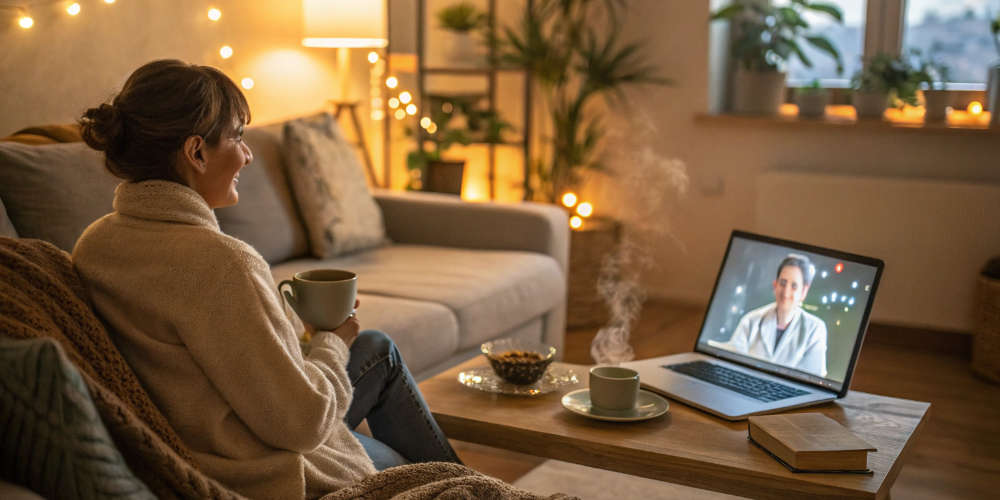Picture this: It’s a rainy Berkeley afternoon, and instead of hustling across town to meet your therapist, you’re curled up on your couch with a cup of tea, ready for your virtual session.
Sounds ideal, right? Online therapy has become a popular option, but is it the right fit for everyone? Let’s explore the possibilities together and see if this modern approach aligns with your needs and lifestyle.
Table of Contents
What Is Online Therapy?
Online therapy, also known as teletherapy, is exactly what it sounds like: therapy sessions conducted online. Instead of meeting in an office, you connect with your therapist through video calls, phone sessions, or even chat platforms. Think of it as mental health support delivered straight to your screen.
For many people, this shift from traditional in-office sessions to digital platforms has been transformative. In Berkeley, where wellness and innovation go hand in hand, many therapists, like Dr. Lynn Winsten, have embraced virtual sessions to cater to diverse client needs.
Beyond its convenience, online therapy opens doors for those who might have avoided therapy due to logistical challenges. For instance, imagine someone juggling a hectic work schedule or a parent struggling to find childcare—online therapy eliminates these barriers.
Plus, it’s backed by research showing its effectiveness for a wide range of mental health issues, including anxiety and depression. It’s not just convenient; it’s a game changer.
The Benefits of Online Therapy in Berkeley
1. Convenience Meets Comfort
Life in Berkeley can be hectic. Between work, school, and navigating the Bay Area traffic, finding time for therapy might feel impossible. With online therapy, you can skip the commute and fit sessions into your busy day.
Imagine having your session during your lunch break or right after you drop the kids at school. You’re not bound by office hours or location, making it a seamless addition to your schedule.
For those living in areas where parking is a headache or for students at UC Berkeley who don’t have a car, this convenience is priceless. It’s therapy on your terms, and that flexibility can be a lifesaver when you’re stretched thin.
2. A Bigger Pool of Therapists
Need an LGBTQ+ affirming therapist or someone specializing in cognitive-behavioral therapy for anxiety? Online therapy expands your options beyond your immediate neighborhood. Whether you’re in Berkeley Hills or downtown, you can connect with the right professional for your needs.
This broader reach means you’re no longer limited by geography. You can find someone who specializes in your specific needs, whether it’s career counseling or help with life transitions. Online therapy levels the playing field, giving everyone access to quality care.

3. Home Sweet Home
Opening up to a stranger can feel daunting. But doing it from your couch? That’s a game changer. Many clients find it easier to talk about tough topics when they’re in a familiar, safe space. Your home becomes your therapeutic haven, free from the intimidating walls of a clinical office.
Plus, for those struggling with mobility issues or chronic illness, online therapy removes the physical strain of traveling. It’s all about creating a space where you feel comfortable and heard.
4. Flexible Scheduling
Therapists like Dr. Winsten often offer evening or weekend sessions online, making therapy accessible even for those with jam-packed schedules. Whether you’re a night owl or an early bird, there’s likely a time slot that fits your routine perfectly.
Challenges of Online Therapy
1. Technology Woes
Let’s be honest—tech isn’t always our friend. A shaky Wi-Fi connection or a glitchy video app can turn a meaningful session into a frustrating experience. If your therapist’s voice keeps cutting out or your screen freezes at an emotional moment, it can feel like the universe is conspiring against you.
Thankfully, most platforms used by professionals, like Dr. Winsten, are secure and reliable. Still, it’s wise to have a backup plan, like switching to a phone call if your internet decides to take a break.
2. Missing the Personal Touch
For some, there’s no substitute for sitting face-to-face with a therapist. Building trust and connection can feel trickier through a screen, especially if you’re tackling issues like trauma or PTSD. Body language, a crucial component of communication, can get lost in the digital shuffle.
3. Distractions at Home
Kids yelling, pets barking, or your neighbor’s DIY project can all disrupt your session. Creating a quiet, private space at home is crucial for online therapy to work. But let’s be real: sometimes life happens, and not everyone has a perfectly serene environment.
4. Not for Everyone
Certain mental health issues, like severe depression or crisis situations, may require in-person care. If you’re unsure, a consultation with an experienced professional, like Dr. Winsten, can help determine what’s best for you. Sometimes, the immediacy of in-person support is irreplaceable.

Is Online Therapy Right for You?
Questions to Ask Yourself
- Do I have a private, distraction-free space for sessions?
- Am I comfortable sharing my feelings over a video call?
- Does my therapist offer online options that meet my needs?
These questions can help you gauge whether online therapy aligns with your personality and lifestyle. If your answers lean toward “yes,” you’re on the right track.
Who Thrives with Online Therapy?
Online therapy is ideal for people with mild to moderate issues, such as anxiety or relationship struggles. Busy professionals, students, and parents often love the flexibility it offers. Imagine tackling your mental health goals while juggling work deadlines or soccer practice—online therapy makes it possible.
When to Choose In-Person Therapy
If you’re dealing with intense trauma or prefer the immediacy of face-to-face interaction, consider exploring in-person therapy in Berkeley. Sometimes, being in the same room as your therapist makes all the difference.
How to Find the Right Online Therapist in Berkeley
Where to Start
- Explore trusted directories like Dr. Winsten’s services.
- Ask friends or family for recommendations.
What to Look For
- Licensed professionals experienced in your area of concern, such as depression therapy.
- Platforms that prioritize privacy and confidentiality.
Choosing the right therapist is like finding the perfect pair of shoes: it might take a few tries, but when it’s right, you’ll feel it.
FAQs About Online Therapy
1. Is online therapy as effective as in-person therapy?
Yes, studies show it can be equally effective for many conditions, including anxiety and mild depression. Consistency and a good therapist-client match are key.
2. What equipment do I need for online therapy?
You’ll need a stable internet connection, a device with a camera, and a quiet space. Bonus points if you have headphones to block out distractions.
3. Can I switch between online and in-person therapy?
Absolutely. Many therapists, like Dr. Lynn Winsten, offer hybrid models so you can transition as your needs change.
Conclusion
Online therapy has opened up a world of possibilities, making mental health support more accessible than ever. Whether you’re navigating life transitions or seeking help for loneliness, it’s worth considering. Ready to give it a try? Reach out to an experienced Berkeley therapist today and take the first step toward your well-being.

